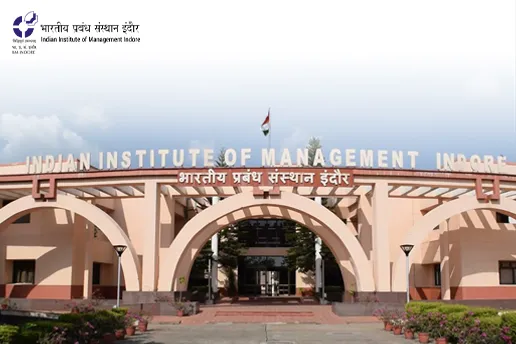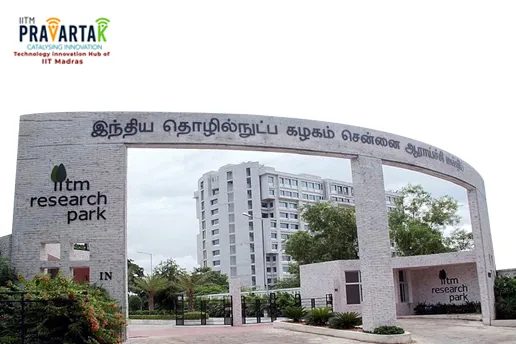What is a Scrum Master and How to Become One? Their Roles & Responsibilities
Table of Contents

Agile frameworks, such as Scrum, are being increasingly adopted throughout industries because they facilitate speed and flexibility in product delivery. Scrum enables companies to respond to market and customer changes with ease, which translates into reducing time-to-market and customer satisfaction.
To efficiently adopt Agile Scrum processes requires an expert, usually a Scrum Master, who directs the team and delivers business requirements successfully. The Scrum Master leads the Scrum process, mentors the team on Agile concepts, clears impediments, and fosters collaboration, enabling the team to optimise its efficiency and deliver useful results. This article will discuss ‘What is a Scrum master?’ and ‘What does a Scrum master do?’, including the roles and responsibilities of a Scrum Master and how to become one.
What is a Scrum Master?
A Scrum Master is a motivator and coach who helps an Agile development team implement the Scrum framework. A Scrum Master ensures that the team understands and applies Scrum principles and practices. Additionally, they are responsible for removing obstacles that hamper the team’s progress and promoting a collaborative and productive environment.
Simply put, a Scrum Master plays a crucial role in helping a Scrum team become more effective and deliver value efficiently.
What Does a Scrum Master Do?
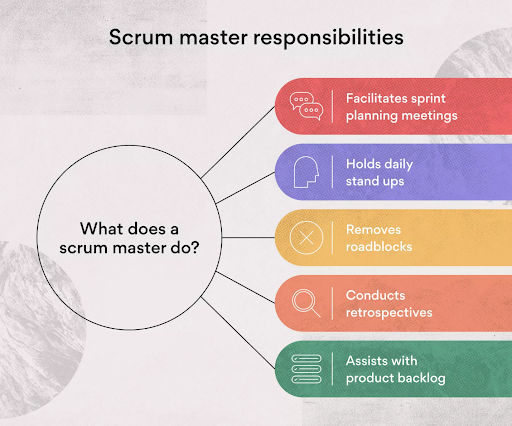
*sprintzeal.com
Now that you know ‘what is a Scrum Master?’, let’s understand ‘what does a Scrum Master do?’ Scrum Masters play important roles in the following:
- Scrum Masters lead key Scrum events like daily stand-ups, sprint planning, sprint reviews, and retrospectives, helping the team stay aligned, identify and resolve issues, and continuously improve.
- They identify and remove obstacles that hinder the team’s progress.
- They act as coaches, guiding the team in understanding and implementing Agile practices and principles.
- They protect the team from external distractions and interferences, allowing them to focus on their work and deliver value.
- They enable communication and collaboration within the team and with stakeholders, ensuring everyone is on the same page.
- They collaborate with the Product Owners to ensure the product backlog is well-defined, prioritised, and ready for the team to work on.
Roles and Responsibilities of Scrum Master
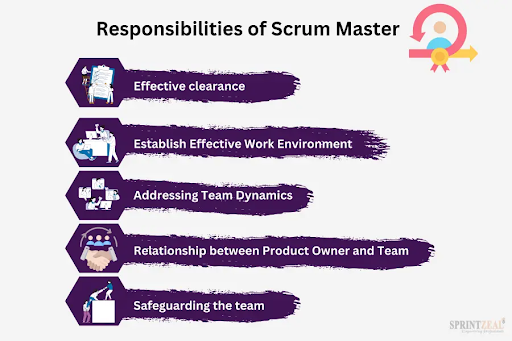
*sprintzeal.com
A Scrum Master is responsible for guiding the team, removing impediments, and promoting a self-organising and high-performing environment. So, let’s understand some essential roles and responsibilities of a Scrum Master.
Facilitation
Facilitation is a crucial responsibility of a Scrum Master for the team’s success. It includes guiding and supporting the team through Scrum events, such as sprint planning, daily scrums, sprint reviews, and sprint retrospectives. They facilitate communication and collaboration within the team and with external stakeholders, ensuring everyone is on the same page and working towards common goals.
Coaching the Team
A Scrum Master acts as a coach for the Scrum team, helping them become self-organising and cross-functional so that they can handle all aspects of the work without relying on external teams or individuals. The Scrum Master ensures that the team understands and applies Scrum principles correctly. This role involves helping the team improve their processes, enhance their collaboration, and deliver value to the customer.
Impediments Removal
The Scrum Master is responsible for identifying and removing impediments that hinder the team’s progress. This involves enabling the team’s efforts to resolve technical issues, coaching them on problem-solving, securing resources, and escalating impediments when necessary. Moreover, a Scrum Master protects the team from distractions and interruptions, allowing them to focus on their work.
Continuous Improvement
A Scrum Master is responsible for promoting a culture of continuous improvement within the team. They identify areas for improvement and implement changes to improve efficiency and effectiveness. Additionally, they train the team on Agile best practices, promote self-organisation, and remove impediments to progress.
Furthermore, Scrum Masters encourage open communication and feedback within the team to foster a safe space for sharing ideas and concerns. They ensure the team learns lessons from past sprints and applies them to future iterations, driving continuous learning and adaptation.
Tracking Progress
The Scrum Master is responsible for tracking and monitoring sprint progress, but not in a way that micromanages the development team. Instead, they enable the team’s ability to track progress, remove impediments, and ensure they are effectively working towards the sprint goal. They monitor the team’s progress and performance metrics, providing transparency and helping the team remain on track.
Serving the Product Owner and Development Team
A Scrum Master‘s responsibility is to serve both the Product Owner and development team by facilitating the Scrum process, removing impediments, fostering a collaborative environment, and ensuring the team is working effectively. This includes guiding the Product Owner to manage backlog effectively and helping the development team to maximise their potential.
How to Become a Scrum Master?
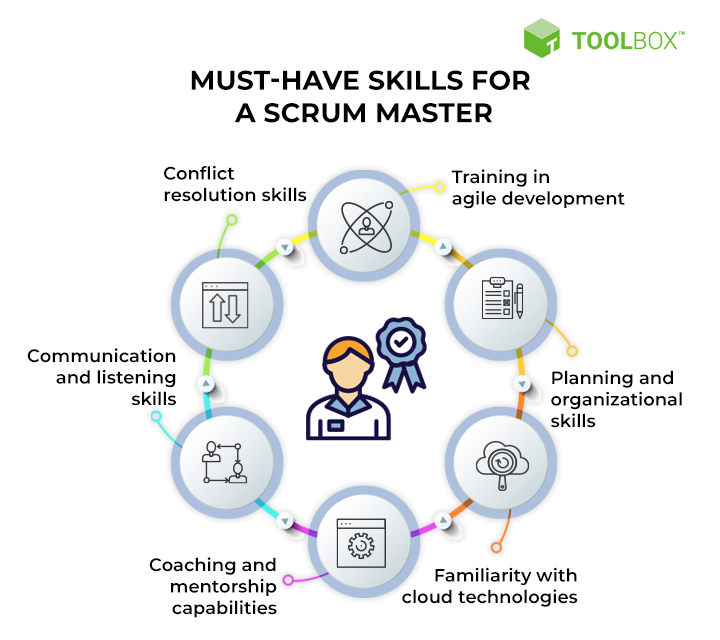
*spiceworks.com
To become a successful Scrum Master, you will need the following skills and qualities:
Consider Certifications
To succeed in a career as a Scrum Master, consider earning a relevant certification, like Certified ScrumMaster (CSM) or Professional Scrum Master (PSM I). It will help you understand Scrum principles and practices, enhancing your credibility and career prospects as a Scrum Master.
Learn the Scrum Framework
Learning the Scrum Framework is essential to becoming a Scrum Master. This involves understanding its core principles, roles, events, and artefacts as outlined in the Scrum Guide. To achieve this, you need formal training, self-study, and practical experience.
Gain Practical Experience
To gain practical experience as a Scrum Master, you can work within an Agile team in any role to understand the dynamics and collaboration, or contribute to Agile projects. Additionally, observing an experienced Scrum Master, facilitating meetings, and implementing Agile practices in a current role are considered valuable steps to becoming a successful Scrum Master. Furthermore, seeking guidance and support from experts can add value to your career.
Problem-solving Skills
To excel as a Scrum Master, strong problem-solving skills are essential. Scrum Masters need to identify and remove impediments, address conflicts within the team, and enable solutions to keep the project on track.
Communication Skills
Strong communication skills are crucial for becoming a successful Scrum Master. This includes the ability to clearly express project goals, enable discussions, and resolve conflicts effectively.
Facilitation Skills
Facilitation skills are essential to excel in a career as a Scrum Master. This involves managing team discussions, promoting collaboration, and ensuring effective communication during Scrum events. Scrum Masters encourage meetings like Sprint Planning, Daily Scrums, Sprint Reviews, and Retrospectives, focusing on outcomes and helping the team resolve issues and make informed decisions.
Adaptability
Adaptability is an essential skill for a Scrum Master, enabling them to adjust to changing situations and effectively guide their teams through various challenges and environments. This involves being flexible, open to new approaches, and able to adapt their methods to suit the specific needs of their team and the project.
Continuous Learning
Continuous learning is crucial for Scrum Masters to stay effective and adapt to the evolving world of Agile methodologies. This involves ongoing professional development, staying up-to-date on new technologies, and seeking opportunities to enhance their skills.
Final Words
A Scrum Master acts as a facilitator and servant-leader who ensures everyone using the Scrum framework stays on track and delivers effective value. They play a crucial role in balancing the needs of the Product Owner and Development Team. The Scrum Master helps the team understand and apply Scrum principles, remove impediments, and foster a collaborative environment.
To become a successful Scrum Master, you should understand Scrum theory and practices, develop essential skills like facilitation, coaching the team, problem-solving, and conflict resolution, and earn specific certifications. By focusing on these aspects, you can effectively develop the role of a Scrum Master and contribute to the success of Scrum teams and organisations.
If you want to transform your career into a Scrum Master, then visit Jaro Education and pursue a relevant certification course.
Frequently Asked Questions
How does a Scrum Master help the Product Owner?
A Scrum Master helps the Product Owner by establishing techniques for effective product goal and product backlog management, ensuring the team understands the need for clear and concise product backlog items.
What are the responsibilities of a Scrum Master?
The key responsibilities of a Scrum Master include:
- Facilitating Scrum events, such as sprint planning, daily scrums, sprint reviews, and sprint retrospectives
- Guiding the team in self-organisation and cross-functionality
- Clearing impediments that hinder the team’s progress
- Coaching the team on Scrum values, principles, and practices
- Helping the Product Owner manage the product backlog
- Promoting a culture of continuous improvement.
What skills are needed to be a Scrum Master?
The required essential skills to be a successful Scrum Master include:
- Communication: Effective communication is crucial for enabling collaboration and resolving conflicts.
- Facilitation: Facilitation is essential for leading effective meetings and discussions.
- Coaching and Mentoring: Scrum Masters are responsible for coaching the team on Scrum practices and helping them grow.
- Problem-solving: Identifying and resolving impediments is a crucial responsibility of a Scrum Master.
- Empathy: Understanding the challenges faced by the team and supporting them is important.
Adaptability: A Scrum Master needs to adjust to changing situations and requirements.
What is the difference between a Scrum Master and a Project Manager?
A Scrum Master acts as a servant leader and coach who helps the team utilise Scrum and remove impediments, while a Project Manager focuses on planning, executing, and controlling projects, usually with deadlines and budgets.
Although both roles are connected, the Scrum Master’s primary responsibility is to enable the team to self-organise and deliver value through Scrum.
Is a technical background required to be a Scrum Master?
No, a technical background is not a mandatory requirement. However, it can be useful when working with development teams. Strong facilitation, coaching, and interpersonal skills are more important for success in a career as a Scrum Master.
What are some common challenges faced by Scrum Masters?
Some common challenges faced by Scrum Masters include:
- Resistance to Change: Teams can resist implementing Scrum or altering their existing procedures.
-
- Limited Knowledge: Stakeholders or team members may lack complete knowledge of the Scrum framework or its advantages.
- Time Limitations: It can be challenging to balance the time requirements of Scrum events, clearing impediments, and mentoring the team.
- Distributed Teams: Working with teams that are geographically dispersed can be challenging for effective communication and collaboration.
- Limited Support From Management: It can be challenging to implement Scrum effectively if management is not supporting it.
Should a Scrum Master be technical?
It is not always required, but a Scrum Master should be technically capable enough to understand the development process and help the team overcome technical obstacles.
How does a Scrum Master help the organisation?
Acting as an Agile change agent, a Scrum Master helps the organisation understand and adopt Scrum principles, increasing team productivity and enabling organisational change.









